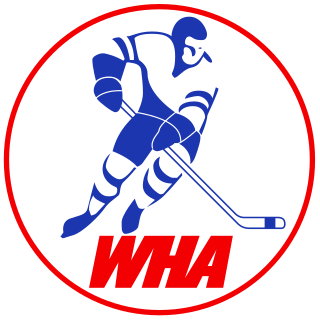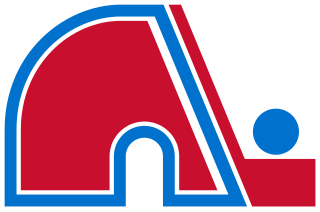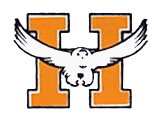The Dennis A. Murphy Trophy was presented annually to the World Hockey Association's best defenceman.
It was named in honour of WHA co-founder Dennis Murphy.
The Dennis A. Murphy Trophy was presented annually to the World Hockey Association's best defenceman.
It was named in honour of WHA co-founder Dennis Murphy.

The World Hockey Association was a professional ice hockey major league that operated in North America from 1972 to 1979. It was the first major league to compete with the National Hockey League (NHL) since the collapse of the Western Hockey League in 1926. Although the WHA was not the first league since that time to attempt to challenge the NHL's supremacy, it was by far the most successful in the modern era.

Guy Damien Lafleur, nicknamed "the Flower" and "Le Démon Blond", was a Canadian professional ice hockey player. He was the first player in National Hockey League (NHL) history to score 50 goals in six consecutive seasons as well as 50 goals and 100 points in six consecutive seasons. Between 1971 and 1991, Lafleur played right wing for the Montreal Canadiens, New York Rangers, and Quebec Nordiques in an NHL career spanning 17 seasons, and five Stanley Cup championships in 1973, 1976, 1977, 1978, and 1979. Lafleur was inducted into the Hockey Hall of Fame in 1988, named one of the 100 Greatest NHL Players in history in 2017, and was named to the Order of Hockey in Canada in 2022.

Patrick Jacques Roy is a Canadian professional ice hockey coach, executive and former player who is the head coach for the New York Islanders of the National Hockey League (NHL). Roy previously served as head coach for the Colorado Avalanche of the NHL, as well as the Quebec Remparts of the Quebec Major Junior Hockey League (QMJHL). In 2017, he was named one of the 100 Greatest NHL Players in history and was hailed in sports media as "king of goaltenders".
He Shoots, He Scores is a Canadian téléroman, or television drama series, revolving around a fictional ice hockey team based in Quebec City. The series aired from 1986 to 1989 on the Radio-Canada network, and revival series on TQS in 2001 and on TVA from 2004 to 2015.

The Quebec Nordiques were a professional ice hockey team based in Quebec City. The Nordiques played in the World Hockey Association (1972–1979) and the National Hockey League (1979–1995). The franchise was relocated to Denver in May 1995 and renamed the Colorado Avalanche. They played their home games at the Colisée de Québec from 1972 to 1995.
The 1980–81 NHL season was the 64th season of the National Hockey League. The New York Islanders were the top regular season team and the top playoff team, winning their second consecutive Stanley Cup by defeating the Minnesota North Stars in five games.

Joseph Henri Jean-Claude Tremblay was a Canadian professional ice hockey defenceman for the Montreal Canadiens of the National Hockey League (NHL) and the Quebec Nordiques of the World Hockey Association (WHA), notable for play-making and defensive skills.

The Beauport Harfangs were a junior ice hockey team in the Quebec Major Junior Hockey League (QMJHL) from 1990 to 1997. The team played its home games at the Aréna Marcel-Bédard in the Quebec City suburb of Beauport. The team's first coach was Alain Chainey, who had previously been an assistant coach with the National Hockey League (NHL)'s Quebec Nordiques. The Harfangs played for seven seasons before relocating to Quebec City in 1997 to become the second incarnation of the Quebec Remparts.
The 1972–73 Quebec Nordiques season was the Nordiques' first season, as they were one of the original teams in the newly created WHA. The Nordiques franchise was originally awarded to a group in San Francisco, California, and was named the San Francisco Sharks, however, funding collapsed prior to the start of the season, and the WHA sold the organization to a Quebec City group led by Marcel Aubut and Paul Racine. They named the club the Nordiques due to the northern location of the team.
The 1973–74 Quebec Nordiques season was the Nordiques second season, as they were coming off a 33–40–5 record, earning 71 points, failing to qualify for the playoffs in their first season.
The 1974–75 Quebec Nordiques season was the Nordiques' third season, as they were coming off a 38–36–4 record in 1973–74, earning 80 points, however, they failed to qualify for the post-season for the 2nd straight season.
The 1975–76 Quebec Nordiques season was the Nordiques fourth season, as they were coming off their best season to date in 1974–75, earning 92 points and finishing on top of the Canadian Division in the regular season, and making it to the Avco Cup finals in the playoffs, where they were swept by the Houston Aeros.
The 1981–82 Quebec Nordiques season was the Nordiques' third season in the National Hockey League. The Nordiques had a successful regular season, qualifying for the playoffs, but they had a better playoff, making it to the Wales Final before losing to the eventual Stanley Cup champion New York Islanders.
The 1976–77 Quebec Nordiques season was the Nordiques fifth season, as they were coming off their best season to date in 1975–76, earning a team record 50 victories and 104 points, as they finished in second place in the Canadian Division. In the post-season, Quebec win their first Avco Cup in team history. Serge Bernier would win the WHA Playoff MVP trophy, as he earned 36 points for the Nordiques in 17 post-season games.
The 1977–78 Quebec Nordiques season was the Nordiques sixth season in the WHA, as they were coming off of a 47–31–3 record in the 1976–77 season, finishing in first place in the Eastern Division. Quebec defeated the New England Whalers, Indianapolis Racers and Winnipeg Jets to win their first ever Avco Cup.
The 1978–79 Quebec Nordiques season was the Nordiques' seventh season in the WHA, were coming off of a 40–37–3 record in the 1977–78 season and a loss in the playoff semi-finals. The Nordiques improved to 41–34–5 to qualify for the playoffs, but lost in the first round to eventual Avco Cup champions Winnipeg Jets.
In ice hockey, the Good Friday Massacre was a second-round playoff match-up during the 1984 Stanley Cup playoffs. The game occurred on Good Friday, April 20, 1984, in Montreal, Quebec, Canada, between the Quebec Nordiques and the Montreal Canadiens. It is notable less for its series-ending finish than its epic brawl between the players, which spanned multiple periods and resulted in 11 ejections and 252 penalty minutes. It was the most infamous episode of the Battle of Quebec.

The Battle of Quebec is a former National Hockey League (NHL) rivalry between the Montreal Canadiens and Quebec Nordiques. The rivalry lasted from 1979–80 to 1994–95. The teams played against each other five times in the NHL playoffs, and the Canadiens won three of the series. One meeting in 1984 resulted in the Good Friday Massacre, a game in which multiple brawls happened. The Battle of Quebec extended to politics, in which the Canadiens and Nordiques became symbols for rival parties, and beer distribution, as the teams were both owned by competing breweries.
Claude Larochelle was a Canadian hockey journalist. During his career, Larochelle led a campaign to try and save the Quebec Nordiques franchise and is the only Quebec City journalist in the Hockey Hall of Fame.